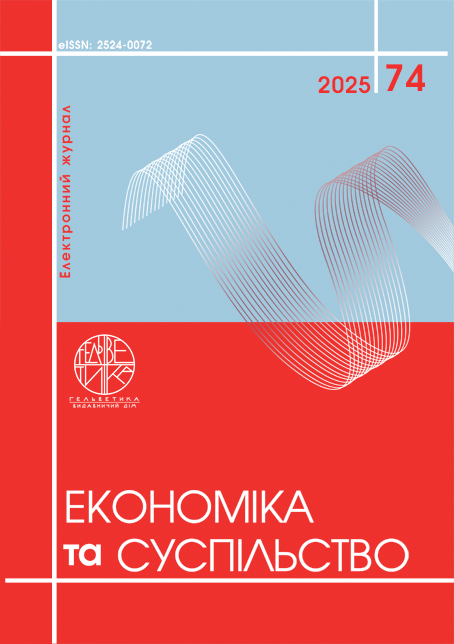АНАЛІЗ ЕФЕКТИВНОСТІ ВПРОВАДЖЕННЯ ТЕХНОЛОГІЙ ШТУЧНОГО ІНТЕЛЕКТУ НА ЕТАПІ ПРОЄКТУВАННЯ ПІДПРИЄМСТВ РЕСТОРАННОГО БІЗНЕСУ
Анотація
У статті досліджено можливості впровадження технологій штучного інтелекту на етапі проєктування підприємств ресторанного бізнесу. Обґрунтовано актуальність цифрових рішень під час розробки концепції закладу, що дає змогу підвищити ефективність просторового планування, фінансового моделювання, логістики, формування меню та маркетингу. Методологія ґрунтується на поєднанні кількісного опитування та якісних інтерв’ю з представниками ресторанної галузі. Виявлено основні напрями застосування інтелектуальних систем, їх переваги, обмеження та бар’єри впровадження. Практична цінність полягає у розробці прикладних рекомендацій для підприємців, архітекторів, консультантів і розробників програмного забезпечення. Запропоновані підходи сприяють ефективнішому прийняттю управлінських рішень та підвищенню результативності проєктів в умовах ринкової нестабільності.
Посилання
Fedosova K., Katunian A. The use of Artificial Intelligence in the restaurant business // Turystyka i Rozwój Regionalny. – 2024. – Vol. 22. – P. 43–51. – DOI: 10.22630/TIRR.2024.22.16.
Винничук Р. О. Штучний інтелект в харчовій промисловості // Грааль науки. – 2024. – № 43. – С. 335–343. – DOI: 10.36074/grail-of-science.06.09.2024.043.
Hussain M., Hashim H., Rahman N. A. Application of artificial intelligence in the food industry: A guideline // Food Engineering Reviews. – 2021. – Vol. 13, No. 4. – P. 690–707. – DOI: 10.1007/s12393-021-09263-7.
Dyshkantiuk Y., Vlasiuk K. Immersive technologies as a tool for innovation in restaurant business management // Entrepreneurship and Innovation. – 2023. – No. 29. – P. 147–152. – DOI: 10.32782/2415-3583/29.22.
Григор’єва Т., Розенвассер Д., Дишкантюк Ю. Інформаційні технології в бізнесі // Економіка та суспільство. – 2025. – № 72. – С. 1–8. – DOI: 10.32782/2524-0072/2025-72-33.
Napier A., Smith B. AI in tourism and customer service // Tourism Technology Journal. – 2021. – Vol. 19, No. 2. – P. 45–67.
Ramirez-Asis E., et al. Machine learning in food supply chain management: A review // Materials Today: Proceedings. – 2022. – Vol. 51. – P. 2462–2465. – DOI: 10.1016/j.matpr.2021.07.223.
McKinsey & Company. AI trends in the hospitality industry // McKinsey Global Report. – 2023. – URL: https://www.mckinsey.com/.
Bouzembrak Y., et al. AI-driven decision making in food technology // Food Science Advances. – 2023. – Vol. 23, No. 1. – P. 99–115.
Napier A., Smith B. AI in restaurant management systems // Restaurant Technology Journal. – 2021. – Vol. 21, No. 1. – P. 101–115.
Berezina K., Ciftci O., Cobanoglu C. Robots, Artificial Intelligence, and Service Automation in Restaurants // In: Ivanov S., Webster C. (Eds.). Robots, Artificial Intelligence, and Service Automation in Travel, Tourism and Hospitality. – Leeds : Emerald Publishing, 2019. – P. 185–219. – DOI: 10.1108/978-1-78756-687-320191010.
Johnson R. B., Onwuegbuzie A. J., Turner L. A. Toward a definition of mixed methods research // Journal of Mixed Methods Research. – 2007. – Vol. 1, No. 2. – P. 112–133. – DOI: 10.1177/1558689806298224.
Harrison R. L., Reilly T. M. Mixed methods designs in marketing research // Qualitative Market Research: An International Journal. – 2011. – Vol. 14, No. 1. – P. 7–26. – DOI: 10.1108/13522751111099300.
Bryman A. Social research methods. – 4th ed. – Oxford : Oxford University Press, 2012. – 766 p.
Kvale S. InterViews: An introduction to qualitative research interviewing. – Thousand Oaks : Sage Publications, 1996. – 326 p.
Yin R. K. Case study research: Design and methods. – 5th ed. – Thousand Oaks : Sage Publications, 2014. – 282 p.
Braun V., Clarke V. Using thematic analysis in psychology // Qualitative Research in Psychology. – 2006. – Vol. 3, No. 2. – P. 77–101. – DOI: https://doi.org/10.1191/1478088706qp063oa.
Fedosova, K., & Katunian, A. (2024). The use of artificial intelligence in the restaurant business. Turystyka i Rozwój Regionalny, 22, 43–51. https://doi.org/10.22630/TIRR.2024.22.16
Vynnychuk, R. O. (2024). Shtuchnyi intelekt v kharchovii promyslovosti [Artificial intelligence in the food industry]. Hraal nauky, (43), 335–343. https://doi.org/10.36074/grail-of-science.06.09.2024.043
Hussain, M., Hashim, H., & Rahman, N. A. (2021). Application of artificial intelligence in the food industry: A guideline. Food Engineering Reviews, 13(4), 690–707. https://doi.org/10.1007/s12393-021-09263-7
Dyshkantiuk, Y., & Vlasiuk, K. (2023). Immersive technologies as a tool for innovation in restaurant business management. Entrepreneurship and Innovation, 29, 147–152. https://doi.org/10.32782/2415-3583/29.22
Hryhorieva, T., Rozenvasser, D., & Dyshkantiuk, Y. (2025). Informatsiini tekhnolohii v biznesi [Information technologies in business]. Ekonomika ta suspilstvo, (72), 1–8. https://doi.org/10.32782/2524-0072/2025-72-33
Napier, A., & Smith, B. (2021). AI in tourism and customer service. Tourism Technology Journal, 19(2), 45–67.
Ramirez-Asis, E., et al. (2022). Machine learning in food supply chain management: A review. Materials Today: Proceedings, 51, 2462–2465. https://doi.org/10.1016/j.matpr.2021.07.223
McKinsey & Company. (2023). AI trends in the hospitality industry. McKinsey Global Report. Retrieved from https://www.mckinsey.com/
Bouzembrak, Y., et al. (2023). AI-driven decision making in food technology. Food Science Advances, 23(1), 99–115.
Napier, A., & Smith, B. (2021). AI in restaurant management systems. Restaurant Technology Journal, 21(1), 101–115.
Berezina, K., Ciftci, O., & Cobanoglu, C. (2019). Robots, artificial intelligence, and service automation in restaurants. In S. Ivanov & C. Webster (Eds.), Robots, artificial intelligence, and service automation in travel, tourism and hospitality (pp. 185–219). Emerald Publishing. https://doi.org/10.1108/978-1-78756-687-320191010
Johnson, R. B., Onwuegbuzie, A. J., & Turner, L. A. (2007). Toward a definition of mixed methods research. Journal of Mixed Methods Research, 1(2), 112–133. https://doi.org/10.1177/1558689806298224
Harrison, R. L., & Reilly, T. M. (2011). Mixed methods designs in marketing research. Qualitative Market Research: An International Journal, 14(1), 7–26. https://doi.org/10.1108/13522751111099300
Bryman, A. (2012). Social research methods (4th ed.). Oxford University Press.
Kvale, S. (1996). InterViews: An introduction to qualitative research interviewing. Sage Publications.
Yin, R. K. (2014). Case study research: Design and methods (5th ed.). Sage Publications.
Braun, V., & Clarke, V. (2006). Using thematic analysis in psychology. Qualitative Research in Psychology, 3(2), 77–101. https://doi.org/10.1191/1478088706qp063oa
Авторське право (c) 2025 Дмитро Харенко, Катерина Федосова, Тамара Новічкова

Ця робота ліцензується відповідно до Creative Commons Attribution 4.0 International License.


